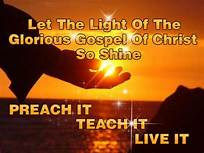Agency was already the rule of Heaven, even in our pre-earth life. when God presented to us the need for a Savior and asked, Whom shall I send, two of His spirit sons responded. The first was Jehovah, the pre-mortal Jesus Christ. He promised to follow the Father's plan as prepared and would give all glory to the Father.
The second to come forward was Lucifer, the rebellious usurper. He wanted the Father's power and His glory. He promised to save everyone, but at what cost? The loss of agency. He and his followers were cast out, never to have bodies, never to progress, never to return to the Father. Lucifer became Satan, the Adversary. He was furious at being thwarted thus. Angry and alienated, he vowed that he would steal away the agency and eternal progression of as many of the Father's children as would follow him. He new he couldn't force or coerce them, so he would need to tempt them. Just as Jesus teaches a little here and a little there, so, too, does Satan tempt us.
Isaiah and Nephi compared this process to a single, thin cord, no heaver than a strand of a spider's web. But because it is not heavy, we often don't realize it is there. If we continue in a direction away from Jesus who advocates and Satan who opposed, the devil can add more strands upon strands upon strands.
Spiders' webs are incredibly light weight, but they are also incredibly strong. If they are allowed to accumulate, they can bind and capture more surely than the heaviest chains. Many an insect has learned this to its sorrow. While this is fairly graphic, it is a good analogy. We should learn from this example.
Satan doesn't tempt us with the big things in the beginning. We have the Light of Christ. We innately know right from wrong. We would recognize the wrong immediately and break the single-strand cord. However, if we allow the cord to stay and continue to pursue the wrong course, we are soon unable to break away.
How does that happen? In many ways. Satan tempts us with the promise of wealth, power, pleasure, and appetite. He can make that this strand look like a string of gold. By the time we realize what it really is, we are caught.
Nephi warns us of the affect others might have upon us. His people had lived among groups of evil men and women who call good evil and evil good. In the Book of Mormon, these are called Secret Combinations.
And there are also secret combinations, even as in times of old, according to the combination of the devil, for he is the founder of all these things; yea, the founder of murder, and the work and the works of darkness; yea, and he leadeth them by the neck with a flaxen cord, until he bindeth them with his strong cords forever. (2 Nephi 26:22)
In this month's Meridian Magazine, there is an article about flax and why the use of a flaxen cord is great imagery. I would invite you to read the entire article. However, I would like to quote just one section as it holds true to the qualities of a spider's web. This section quotes Isaiah and points out that in Ancient Israel, a strand flax is called a tow.
 |
| Flax Fibers |
The words of the antithesis between strength and flimsy is a good definitions of a spider's web. If the strong shall be as tow, none of us can rest on our laurels and think we are immune to Satan's snares, even if we feel we are strong.
© February 2020 Dr. Kathleen Rawlings
Buntin Danielson

















































